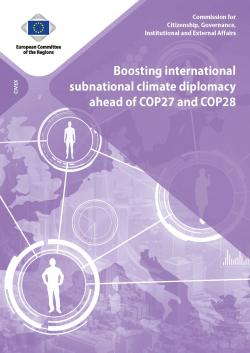Boosting international subnational climate diplomacy ahead of COP27 and COP28

Climate diplomacy does not have a universal definition. Nevertheless, it generally refers to the use of diplomatic tools to support the achievement of international climate goals and mitigate the negative impacts of climate change on peace, stability and prosperity. Climate diplomacy entails prioritizing climate action in relations with partners worldwide, shaping foreign policy agendas and building partnerships that tackle simultaneously climate and other foreign policy objectives such as peace building or strengthening multilateralism. At the EU level, the EU Council defines climate diplomacy as “EUʼs work in both multilateral fora and at a bilateral level on promoting ambitious global climate goals and actions in pursuit of a planetary transition towards climate neutrality”. The 2018 EU Parliament resolution on climate diplomacy1 defines it as “a form of targeted foreign policy to promote climate action through reaching out to other actors, cooperating on specific climate-related issues, building strategic partnerships and strengthening relations between state and non-state actors, including major contributors to global pollution, thereby contributing to mitigating the effects of climate change, as well as to enhancing climate action and strengthening Union’s diplomatic relationships”. Bilateral and multilateral diplomatic relations on climate issues are largely characterized by traditional state-to-state diplomacy. Nevertheless, several studies and experts highlight those contemporary global challenges are transforming traditional diplomacy and climate change is playing a major role in this process. Over the years, while national governments repeatedly failed to make substantial commitments to address climate change, new diplomatic players started to emerge bringing forward ambitious commitments. In particular, cities and – to a lesser extent - other subnational actors are gaining increasingly significant importance in climate diplomacy.
-
Details
(with Anna Maria Augustyn and Marie-Eve Ciparisse), Brussels, European Committee of the Regions, 2022, 46 p. -
ISBN/ISSN/DOI:
978-92-895-1237-4; 10.2863/020756


